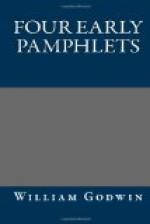The public has been for some time agreed that Mr. Hayley is the first of English poets. Envy herself scarcely dares utter a dissentient murmur, and even generous emulation turns pale at the mention of his name. His productions, allowing for the very recent period in which he commenced author, are rather numerous. A saturnine critic might be apt to suspect that they were also hasty, were not the loftiness of their conceptions, the majesty of their style, the richness of their imagination, and above all, the energy both of their thoughts and language so conspicuous, that we may defy any man of taste to rise from the perusal, and say, that all the study and consideration in the world could possibly have made them better. After a course however of unremitted industry, Mr. Hayley seemed to have relaxed, and to the eternal mortification of the literary world, last winter could not boast a single production of the prince of song. The muses have now paid us another visit. We are very sensible of our incapacity to speak, or even think of this writer with prosaic phlegm; we cannot however avoid pronouncing, that, in our humble opinion, Mr. Hayley has now outdone all his former outdoings, and greatly repaid us for the absence we so dearly mourned.
We are sensible that it is unbecoming the character of a critic to lay himself out in general and vague declamation. It is also within the laws of possibility, that an incurious or unpoetical humour in some of our readers, and (ah me, the luckless day!) penury in others, may have occasioned their turning over the drowsy pages of the review, before they have perused the original work. Some account of the plan, and a specimen of the execution may therefore be expected.
The first may be dispatched in two words. The design is almost exactly analogous to that of the Essay on History, which has been so much celebrated. The author triumphs in the novelty of his subject, and pays a very elegant compliment to modern times, as having been in a manner the sole inventors of this admirable species of composition, of which he has undertaken to deliver the precepts. He deduces the pedigree of novel through several generations from Homer and Calliope. He then undertakes to characterise the most considerable writers in this line. He discusses with much learning, and all the logical subtlety so proper to the didactic muse, the pretensions of the Cyropedia of Xenophon; but at length rejects it as containing nothing but what was literally true, and therefore belonging to the class of history. He is very eloquent upon the Shepherd of Hermas, Theagenes and Chariclea, and the Ethiopics of Heliodorus. Turpin, Scudery, Cotterel, Sidney, the countess D’Anois, and “all such writers as were never read,” next pass in review. Boccace and Cervantes occupy a very principal place. The modern French writers of fictitious history from Fenelon to Voltaire, close the first epistle. The second is devoted to English authors. The third to the laws of novel writing.




